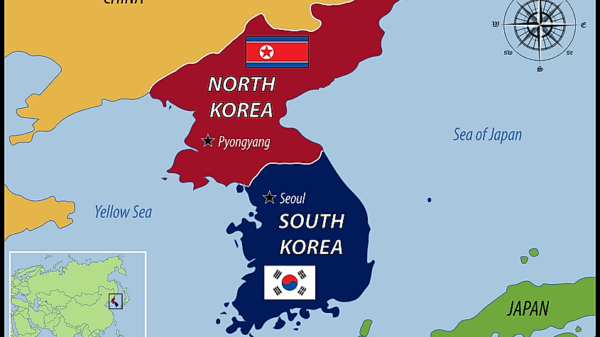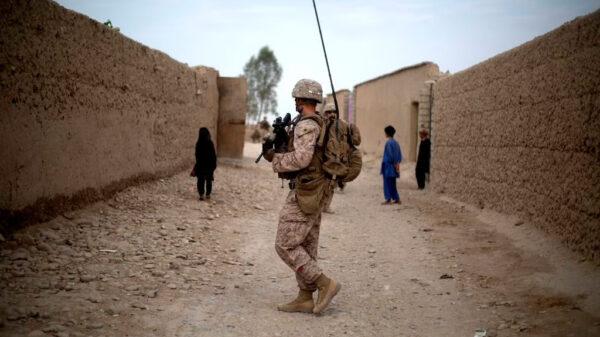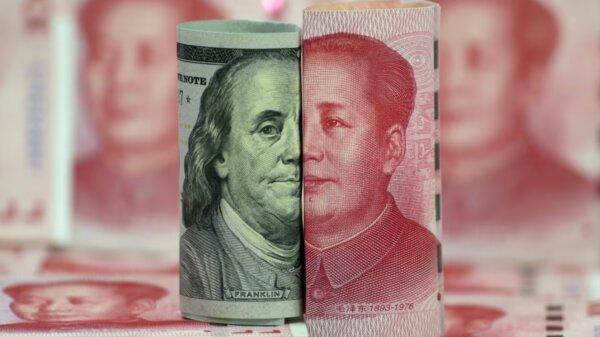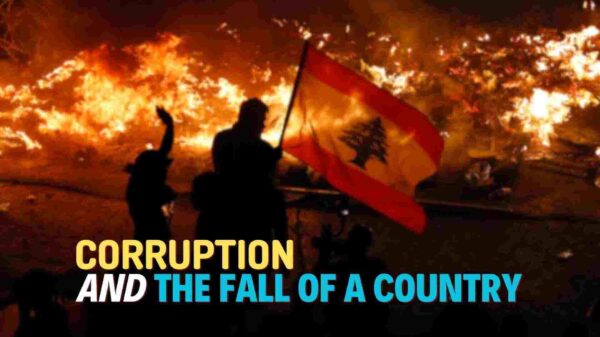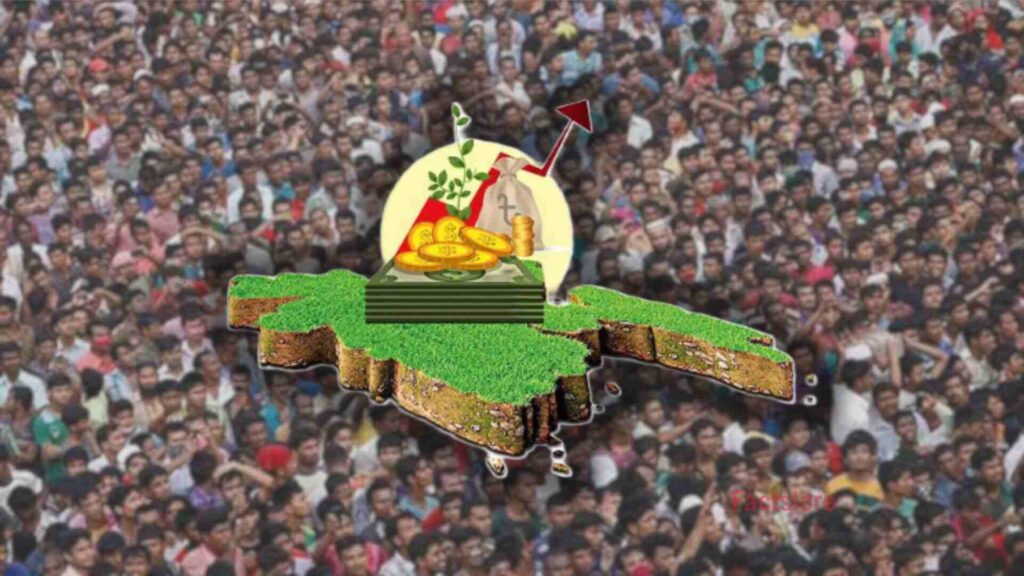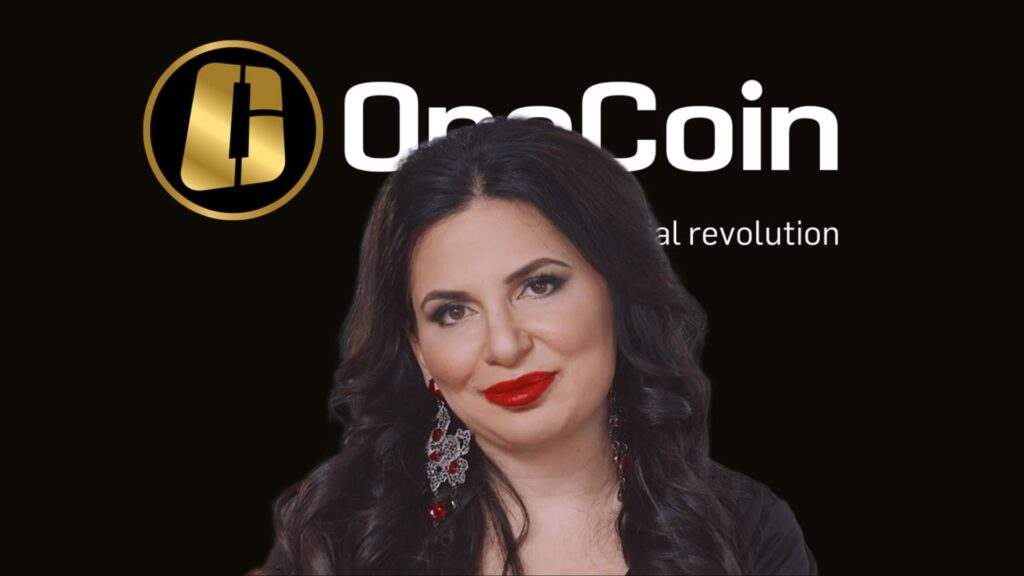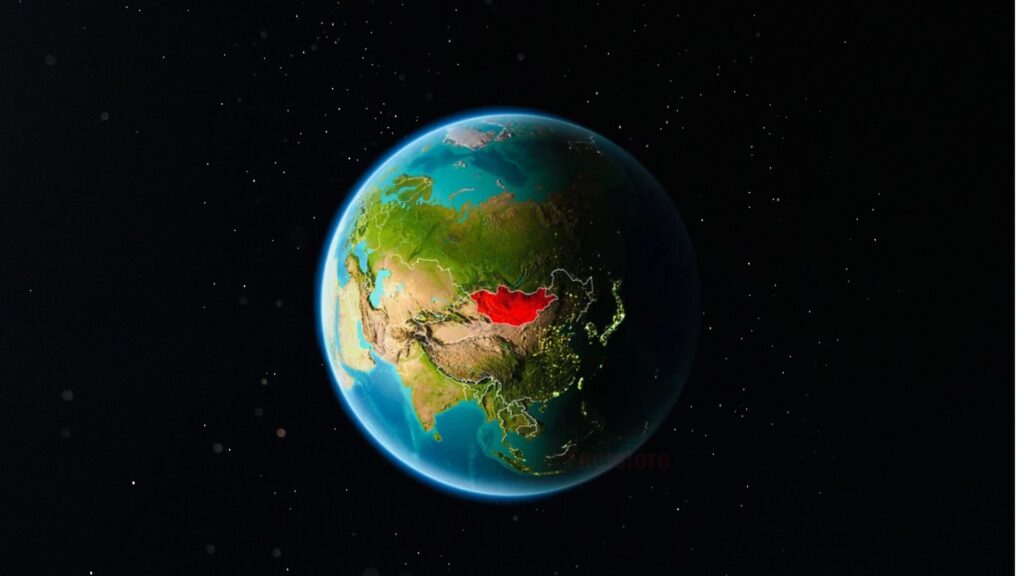There is so much happening in Sudan. It’s a country in crisis, with political unrest, economic turmoil, and ongoing conflicts leading to humanitarian suffering for millions of people. The country has been grappling with instability and violence for decades, including a 30-year civil war between the North and South that ended in 2005. However, despite the peace agreement that led to the formation of South Sudan, Sudan has continued to face multiple challenges, including a military coup in 2019, which led to the overthrow of former President Omar al-Bashir. The current transitional government has been struggling to stabilize the country, with rising inflation, food and fuel shortages, and violence in Darfur, South Kordofan, and Blue Nile states, leading to a worsening humanitarian crisis.
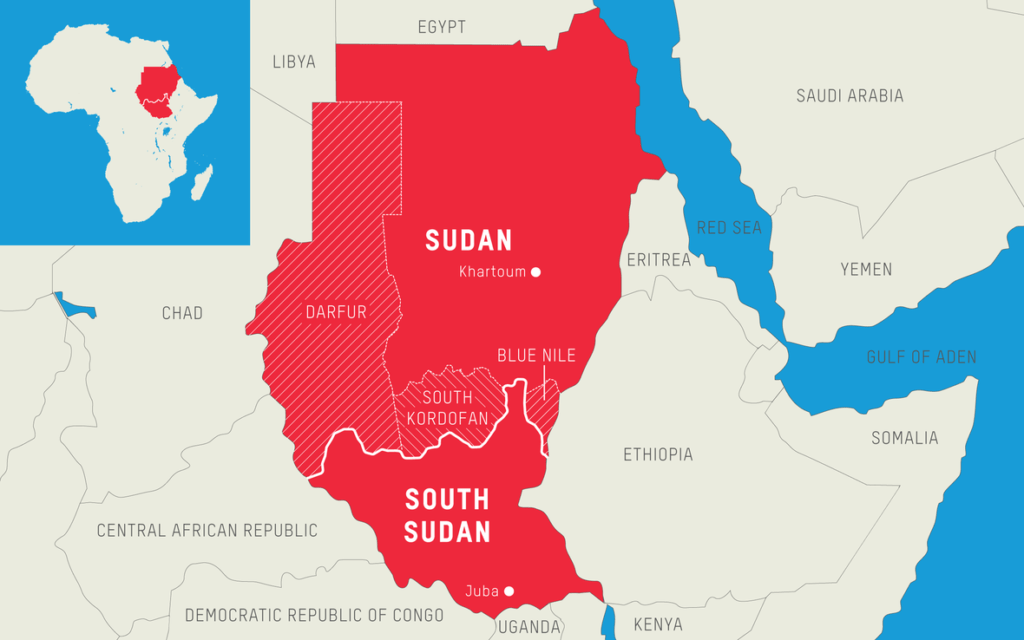
Before we go deep into the Sudan Crisis, first, see the country’s position on the map. There is Sudan, right below Egypt. Sudan also has a coastline with the Red Sea. Now, there is also another country called South Sudan. Initially, it was all part of one country, that is Sudan. But then, on July 9th, 2011, there was a referendum and South Sudan gained its independence from Sudan. Actually, since the 1980s, both the North and South of Sudan were constantly fighting each other in the form of a Civil War.
The reasons behind this conflict are, mainly because of differences in religious practices, ethnicity, economics, and politics. The northern part of Sudan is primarily dominated by Arab Muslims, so they supported the government of Sudan. Then, in the southern part of Sudan, there is a group called Sudan People’s Liberation Movement or Army (SPLM/A), and this group was mainly composed of black African Christians and others who follow traditional African religion.
Due to the differences between the government of Sudan, which was dominated by the Arab Muslims from the North, and the Sudan People’s Liberation Movement/Army, which was composed mainly of black African Christians and other black Africans who followed traditional African religion (they are basically called animists), from the south of the country, there was a devastating Civil War in Sudan that lasted for about 30 years. As a result of the conflict, an estimated 2 million people lost their lives, and millions were displaced and forced to leave their homes and seek refuge elsewhere.
Then, in Jan 2005, a comprehensive peace agreement was signed between the Sudan government and the SPLM/A. This agreement also had provisions for power sharing, wealth sharing, security, and governance. This way, on July 9, 2011, South Sudan gained its independence and became Africa’s 55th country. And can you guess who were the mediators? In other words, who came up with this comprehensive peace agreement? You can take a blind guess; it was the United Nations, the United States and all the countries that exist on the African continent. But the main international organization was the United Nations, and the main country was the United States of America. And everyone knows that the United States is one of the founding members of the United Nations and has played a significant role in its development. Now, officially, nowhere will you find that the U.S controls the U.N. However, if you critically examine things and study enough to gain a deep understanding of the power dynamics within the UN, you will realize that the U.S controls it to a great extent. So, the country that chose to be the mediator and came up with this comprehensive peace agreement between North and South Sudan is none other than the United States of America, basically the US government.
If you understood how South Sudan gained independence, let’s come back to the present time. There’s given you a brief history; keep that in mind because a lot of it is still relevant, and wherever required, you should be able to make connections between past and present.
Overview of the conflict in Sudan
Now let’s come to the main question of this article: What is currently happening in Sudan? This time, the problem is not between Sudan and South Sudan. Violence has erupted in the capital city of Khartoum and a few other nearby places. Who are the two parties that are fighting? It’s between the General Abdel Fattah al-Burhan and the Deputy General Mohamed Hamdan Dagalo, who is also the leader of the Rapid Support Forces, a paramilitary force in Sudan. General Abdel Fattah Al-Burhan is the general of the Sudanese Army and also the de facto ruler of Sudan, or you can simply call him the president. Mohamed Hamdan Dagalo is also a general but one rank junior to Abdel Fattah Al-Burhan, so he is basically the vice president. Basically, what is happening in Sudan is that the Sudanese Army Chief General Abdel Fattah Al-Burhan is now in a battle with his second-in-command General Mohamed Hamdan. These are the two characters who have turned against each other and are fighting for power in Sudan, causing chaos.
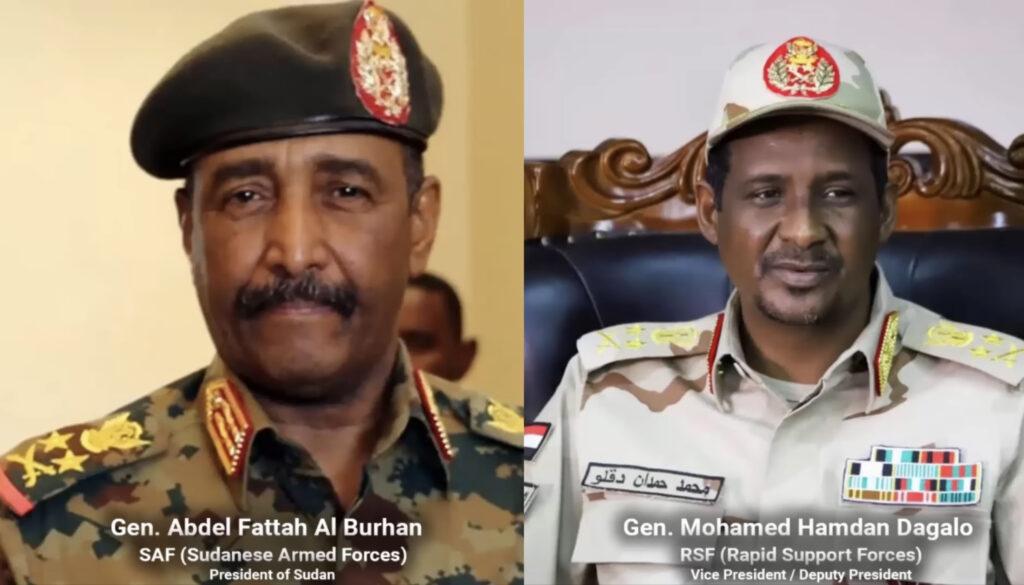
But simply pointing out these two characters is not the end of the whole story. There is a broader global power struggle behind this chaos in Sudan. Let’s study a little background on these two generals. In 2011, South Sudan gained independence, but what about the main country Sudan? You have to understand that in Sudan, whoever became the state head, that is the president, either came from civil society as a politician or directly came from the military as a serving officer. Besides the president, there is also a prime minister in Sudan who is usually a politician and came into power through democratic elections.
Abolishment of Prime Minister position
Omar Al-Bashir was the head of Sudan, the president of Sudan, from 1989 to 2019. He became the president of Sudan on 30th June 1989. He was a military officer when he came to power in 1989, a brigadier general in the Sudanese Army. As soon as he became the president in 1989, he abolished the position of prime minister. Basically, Omar Al-Bashir, along with a group of army officers, overthrew the democratically elected government of Prime Minister Sadiq Al-Mahdi in 1989. Since then, he abolished the prime minister position in Sudan, meaning there was no prime minister position in Sudan since 1989. Omar Al-Bashir wanted to have all power to himself and wanted to rule Sudan without any external civil government. That means the whole civil war between North and South Sudan happened during his time. South Sudan gained independence in 2011, which also happened during his tenure. After 2011, he was the one who was practically ruling and running Sudan.
In 2019, President Omar al-Bashir appointed Abdel Fattah Al-Burhan as Inspector General of the Sudanese Army. Two months later, General Abdel Fattah Al-Burhan, along with his Deputy General Mohamed Hamdan Tagalo, overthrew President Omar al-Bashir. General Burhan became the president of Sudan on April 11, 2019.
Tagalo’s rise to power in the RSF
Mohamed Hamdan Tagalo came into the picture in 2015 when he was commanding Sudanese troops in Yemen as part of the Saudi-led Coalition Force, who were fighting against the Iran-backed Houthi rebels. During that time, both Tagalo and General Burhan worked closely. Tagalo was head of the RSF (Rapid Support Forces), a separate paramilitary force of Sudan, which was also deployed in Yemen.
President Omar al-Bashir, who himself was an army officer, knew that he might be overthrown in a similar way he overthrew a civilian government to become president in 1989. He never fully trusted General Burhan and started relying on Tagalo and the RSF as a counterweight to the regular Armed Forces, hoping it would be too difficult for a single armed group to depose him. However, both General Burhan and Tagalo worked together and overthrew Bashir in April 2019.
Tagalo’s support was instrumental in General Burhan becoming the president of Sudan in 2019. In the same year, General Burhan solidified Sudan’s ties with global powers and regional players, including the United States and Israel. To form relationships with countries like the United States and Israel, Sudan had to look democratic. To achieve this, in August 2019, they formed a body called the Transitional Sovereignty Council (TSC), which would be the federal government, that is running Sudan.
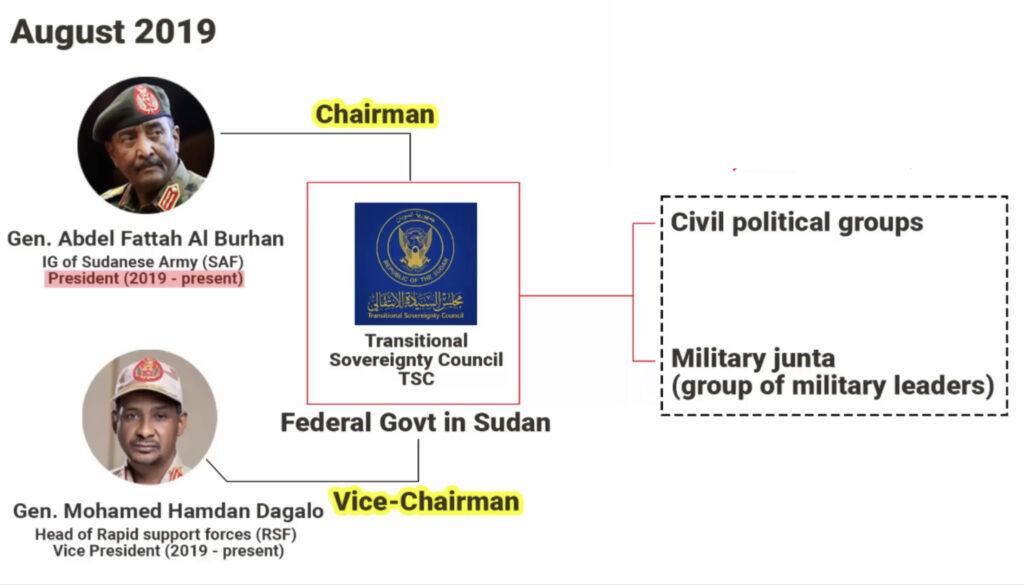
The TSC is a multi-partisan body that is a coalition of both civil political groups and the military junta (group of military leaders). The chairman of this multi-partisan body was General Abdel Fattah Al-Burhan, who created this constitutional body to make the political scenario in Sudan look a little democratic. General Burhan made Mohamed Hamdan Tagalo the vice-chairman of TSC. The purpose behind the creation of the TSC was to make the political scenario in Sudan appear democratic. It was also formed as a part of a political agreement between the military and the opposition forces who no longer wanted to see Omar al-Bashir as president.
Multi-partisan Coalition of Civil & Military groups
General Burhan, the Chairman of TSC, met with United States Secretary Mike Pompeo in Khartoum immediately after its creation in December 2019. Then in the same year, President Trump invited the head of Sudan’s Sovereign Council, General Abdel Fattah al-Burhan, to Washington to establish stronger bilateral ties between the two countries after decades of hostility. In 2020, General Burhan met with Israeli Prime Minister Benjamin Netanyahu in Uganda and maintained a close relationship with Egypt. He also made several trips to rich Gulf countries because Sudan heavily depends on exports coming from the Gulf countries like Saudi Arabia and UAE. All these international interactions continued until October 2021 when General Burhan and his Deputy Dagalo orchestrated a coup against all the civilian political groups that were part of the TSC.
If you remembered, the TSC is a multi-partisan body that is a coalition of both civil and military groups. In October 2021, the military officers who were part of the TSC decided to remove the civilian politicians, which led to the dissolution of the TSC by orchestrating a military coup, known as the 2021 Sudan coup d’état. Before forming the TSC, there was an agreement between the civilian political groups and the military Junta. According to the agreement, the TSC would last for only 39 months, i.e., three years and three months, with the military Junta ruling for 21 months and the civilian political leaders ruling for 18 months. The 21 months of military rule were supposed to end in November 2021, but on 25th October 2021, General Burhan, along with the Sudanese military, hijacked the government in a military coup. They detained several civilian government officers, ministers, members of political parties, lawyers, civil society activists, and journalists. Many of them were even put on house arrest. The October 2021 Sudan coup d’état was organized because the military did not want to hand over the government control to the civilian political parties.
Burhan and Dagalo’s rule in Sudan after the 2021 coup
After the 2021 coup, both Burhan and Dagalo ruled Sudan, but they started having disagreements. General Burhan initiated the process of reinstating individuals who were previously associated with Omar al-Bashir’s regime, including Islamists, to their former positions. This is when Dagalo started having doubts.
See, someone who helps in overthrowing another individual or group will always have the doubt of being double-crossed or betrayed in the future. In the past, Omar al-Bashir and his people trusted Tagalo and the RSF as a counterweight to the regular armed forces. However, after the 2021 coup, General Burhan began reinstating individuals who were previously associated with Omar al-Bashir’s regime. This made the Dagalo feel that Omar al-Bashir’s people would never fully trust him. This was proven true in 2019 when Degalo betrayed them.
Moreover if you look at the Sudanese politics, it has always been dominated by an elite group of people who largely came from ethnic groups based around the region of Khartoum and the River Nile. On the other hand Dagalo, who comes from Darfur in the west, is from a rural area. The Sudanese political elite often talked about him and his soldiers, that is the RSF, in derogatory terms, calling them country bumpkins unfit to rule the state. However, over the last two years, since the 2021 coup, Dagalo has been trying to position himself as a national figure. He started calling himself a representative of the marginalized section of society and forming alliances with rebel groups in the Darfur region and South Kordofan. In 2003, he conducted many counter-insurgency operations against Darfuri rebels, giving him a good grip on the region. Even General Burhan was aware of these things and there were many in his close circles who were giving inputs on Dagalo. The same was happening with Dagalo, who was also getting inputs about Burhan. This is how the fighting began, with the RSF against the SAF and Dagalo against General Burhan. The two generals are now battling for supremacy and tearing Sudan apart.
Over the last few years, Dagalo has built a vast business empire, including interests in gold mines and many other sectors, such as investment, mining, transport, car rental, iron, and steel. This has given him power and resources. Currently, the situation is tense as both the civilian political leaders and General Burhan, who represents the Sudan armed forces, are considering a proposal to place the paramilitary rapid support force, that is, the RSF, under the control of the Sudanese Army. The RSF has around 100,000 members, and naturally, Dagalo, who is the leader of RSF, is not in favor of this. In fact, now there are reports that General Burhan has ordered the disbandment and dissolution of the RSF, declaring it as a rebel group. However, Dagalo is not going to get scared or back off, so this has become the main source of recent tension.
RSF and Sudanese Military Conflict
On the morning of Saturday, 15th April, the RSF fired some shots in public, which quickly escalated in different parts of the country. It is not exactly clear where the RSF bases are, but it seems that their fighters have moved into densely populated areas. The Sudanese Air Force has mounted airstrikes in the capital city against RSF members, which is also likely to have led to civilian casualties.
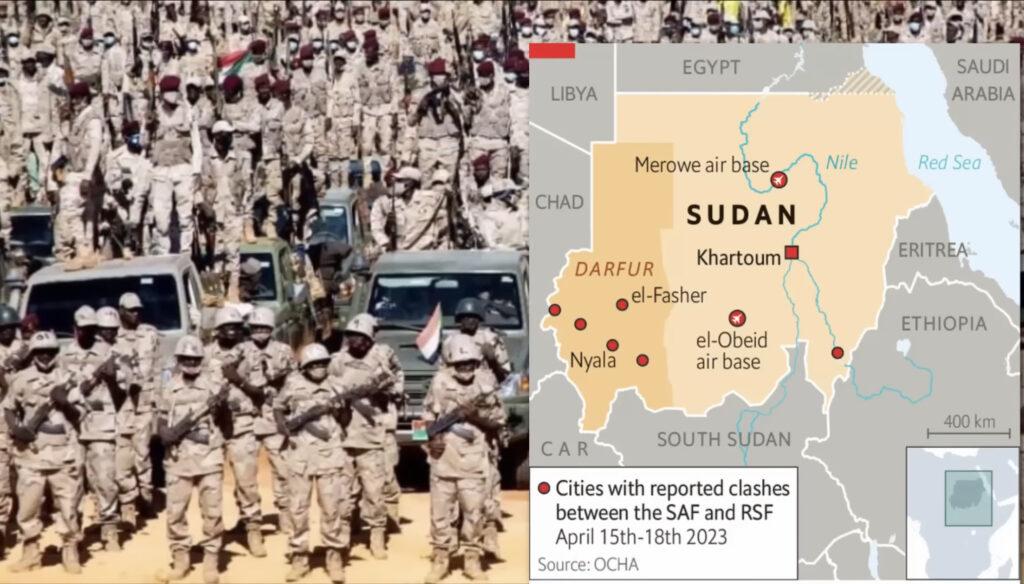
The important question that must be going on in the readers mind is: what do the two sides want? Let explain it in a simple manner. General Dagalo presents himself and the RSF as being on the side of the people. He’s telling the people of Sudan that he is with them, and together they will go against the Khartoum political elites that previously have been told about. While he is getting some support from the Darfur region and South Kordofan, but there are many people who don’t believe him because he and his RSF have conducted many counter operations against innocent people.
Now, if you look at General Burhan, who is from the Sudanese Armed Forces, he is saying that the army will only fully hand over power to an elected government. He also expects that the civilian politicians will have to share power with the military. Basically, General Burhan wants this situation to be how it was before 2021. Again, there are many who don’t believe General Burhan as well. So these are the claims from both sides.
Global powers struggle for influence in Sudan
Now the next important question is: what other countries are doing? As it is said in the beginning, if you remember, there is a broader global power struggle behind this chaos in Sudan. The UK, US, and European Union have called for a ceasefire and talks to resolve the crisis. But then, if you see, Western nations have very little leverage right now because Sudan has been largely isolated since the 2021 coup. The United States is currently looking at the full range of options. The only thing that they can do is put sanctions against members of SAF and RSF, but that is not going to help. It’s quit impossible that the United States is going to put troops in Sudan. Plus, the US doesn’t have the appetite to enter into another conflict.
Meanwhile, some of the Western media outlets have suggested that the Russian mercenary group called The Wagner Group is operating in Sudan, and Russia is indirectly supporting General Dagalo. Now, these Western media articles also say that the Russian mercenary group is getting gold in return for helping General Tagalo and the RSF. It’s not confirmed that how far these articles are true. After the Russia-Ukraine conflict, these Western media articles have permanently taken a stand against Russia, so they will write everything against Russia. But one thing needs to be point out is that Russia wants to establish a naval base in the Red Sea on the Sudanese coastline, so that Russia gets access to the Indian Ocean. It was General Dagalo who went to Moscow and agreed to his plan, so if you see, Russia does have an interest in Sudan.
Now, regional heavyweights like Saudi Arabia and UAE even they have close ties with General Dagalo and the RSF. If you remember, the RSF has sent thousands of fighters to support the Saudi war in Yemen. It’s also not so sure whether Saudi Arabia wants to get involved in Sudan because right now it is busy to forming new relations with Iran.
Anyhow, it is important to note that many African countries possess abundant natural resources such as oil, gas, and minerals. The methods employed by global powers such as Western nations as well as those in the East like Russia and China to get involved in these countries are quite different.
Western countries often use justifications such as promoting democracy, human rights, women’s rights, etc., whereas Russia and China tend to intervene through infrastructure investment. As it is said in the beginning of the article, the United States was involved in creating a comprehensive peace agreement between Sudan and South Sudan, which led to South Sudan’s independence. Any kind of mediation from the Western countries in Sudan will come only through the United Nations and African Union. The United States will not get directly involved, but Western powers fear Russia could establish a military base on the Red Sea.
When it comes to neighboring countries like Egypt, Ethiopia, and Eritrea, their interest will align with the side that emerges as the winner once the two generals resolve their conflict. So let’s see what happens, but this is everything that you have to know about what is happening in Sudan.


